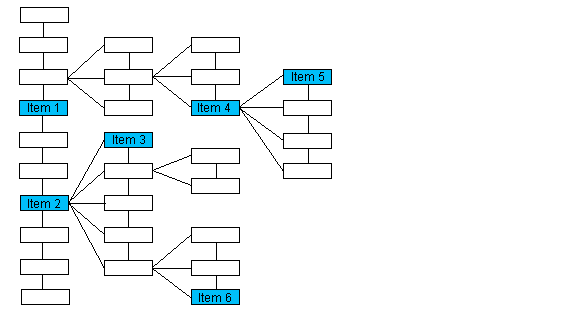
LDicomIOD::GetChild
#include "Ltdic.h"
static pDICOMIOD LDicomIOD::GetChild(pIOD)
|
pDICOMIOD pIOD; |
/* pointer to a DICOMIOD structure */ |
Returns a pointer to the item in the IOD Structure that contains the first child of the specified item.
|
Parameter |
Description |
|
pIOD |
Pointer to a DICOMIOD structure that contains an item in the IOD Structure. |
Returns
|
!NULL |
A pointer to a DICOMIOD structure that contains the item in the IOD Structure that is the first child of the item specified in pIOD. |
|
NULL |
pIOD has no child items. |
Comments
This function requires that the IOD Structure is evaluated as a tree structure.
The child is the offspring one level lower than the specified item. If the specified item has no child items, this function will return NULL. For example:

|
If the passed pointer points to : |
The function returns a pointer to : |
|
Item 1 |
NULL |
|
Item 2 |
Item 3 |
|
Item 4 |
Item 5 |
|
Item 6 |
NULL |
The following functions will also help you navigate the IOD Structure:
Required DLLs and Libraries
|
LTDIC For a listing of the exact DLLs and Libraries needed, based on the toolkit version, refer to Files To Be Included With Your Application |
See Also
|
Functions: |
LDicomIOD::GetFirst, LDicomIOD::GetLast, LDicomIOD::GetNext, LDicomIOD::GetPrev, LDicomIOD::GetCountModule, LDicomIOD::GetRoot, LDicomIOD::GetParent |
|
Topics: |
Example
/* This example displays in a tree control the tree of the IOD table */
L_VOID ShowTree(CTreeCtrl *pDlg, HTREEITEM hParentItem, pDICOMIOD pParentIOD)
{
HTREEITEM hItem;
pDICOMIOD pIOD;
if (pParentIOD == NULL)
{
pIOD = LDicomIOD::GetFirst(pParentIOD, TRUE);
}
else
{
pIOD = LDicomIOD::GetChild(pParentIOD);
}
while (pIOD != NULL)
{
hItem = pDlg->InsertItem(pIOD->pszName, hParentItem, TVI_LAST);
if (LDicomIOD::GetChild(pIOD) != NULL)
{
ShowTree(pDlg, hItem, pIOD);
}
pIOD = LDicomIOD::GetNext(pIOD, TRUE);
}
}
L_VOID Test(CTreeCtrl *pDlg)
{
ShowTree(pDlg, TVI_ROOT, NULL);
}